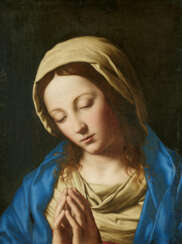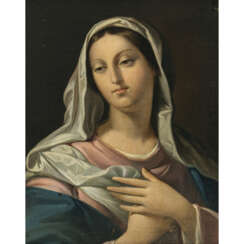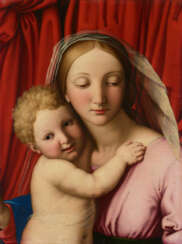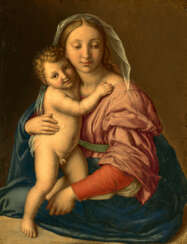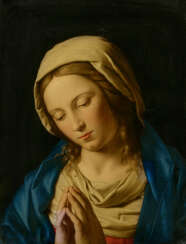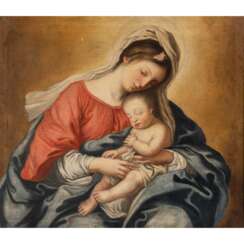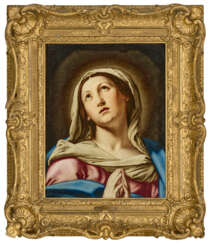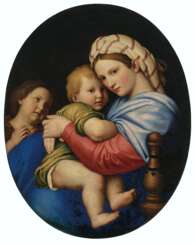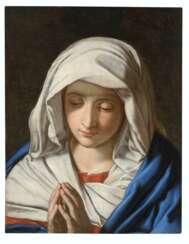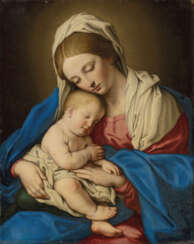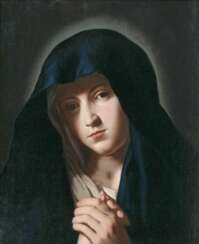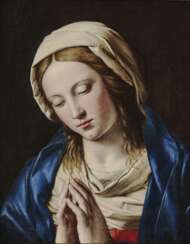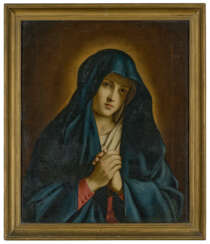Giovanni Battista Salvi (1609 - 1685) — Auction price
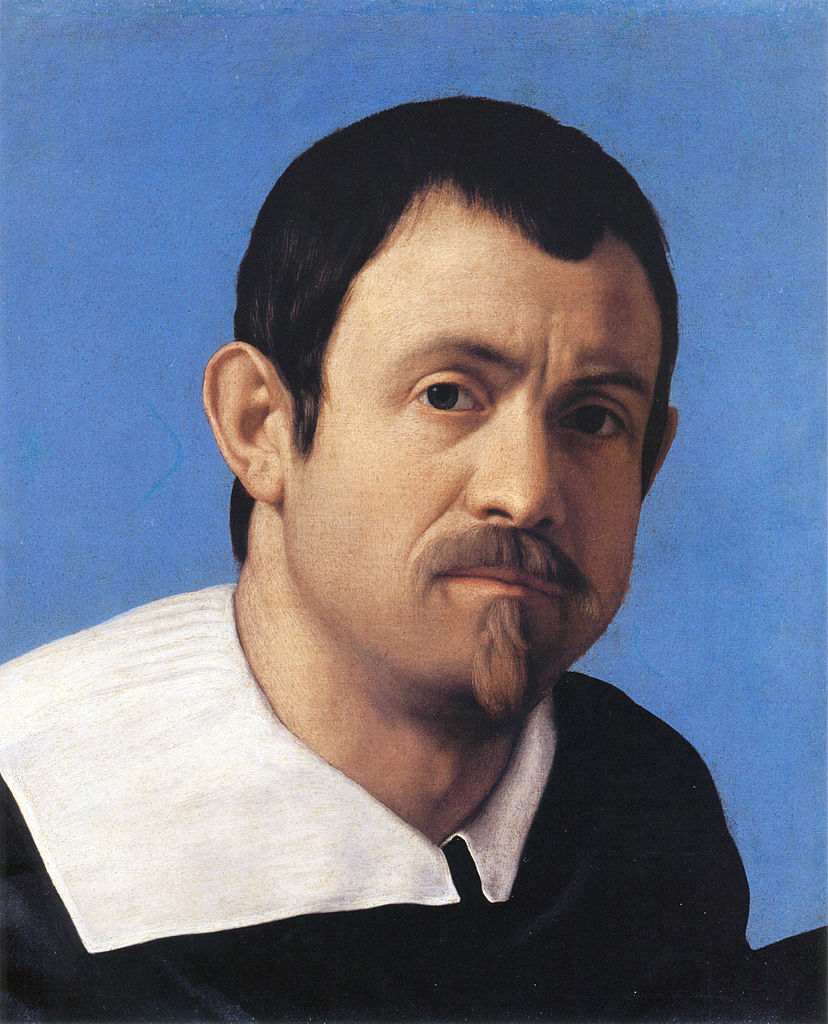
Giovanni Battista Salvi, known as Sassoferrato, was an Italian Baroque painter born in 1609 in Sassoferrato, from which he derived his name. He is celebrated for his deeply devotional images, particularly of the Virgin Mary, rendered with an elegance that echoes the works of Renaissance masters like Raphael and Perugino. Salvi's commitment to these older styles, amidst the 17th-century Roman art scene, marked his work as consciously anachronistic, emphasizing traditional religious themes and the serene beauty of his subjects.
Sassoferrato's training under his father and possibly under Domenichino in Rome, as well as influences from Guido Reni and Francesco Albani, equipped him with a unique blend of styles. He concentrated on creating multiple copies of devotional images, catering to the private market's demand during the Counter-Reformation. Despite a few public commissions, his legacy includes works in major collections such as the National Gallery in London and the British Royal Collection. Sassoferrato's art, particularly noted for its immaculate execution and spiritual aura, was highly regarded until the mid-19th century and has seen a revival in interest since the late 20th century.
One of his most revered works, "The Virgin in Prayer," showcases Sassoferrato's mastery in portraying the Virgin Mary with a life-like presence, using minimal but vibrant colors to highlight her contemplative grace. This piece, along with others, reflects the Catholic Church's 16th-century reforms advocating for personal devotion, a theme Sassoferrato adeptly captures through his intimate and contemplative religious scenes.
Despite the breadth of his work, Sassoferrato remains a somewhat enigmatic figure, with his art often overshadowing the details of his life and career. Yet, his paintings continue to be a source of admiration for their serene beauty and spiritual depth, appealing to collectors and art enthusiasts alike.
For those interested in exploring the work and legacy of Giovanni Battista Salvi, consider signing up for updates on new discoveries, sales, and auction events related to his art. This subscription ensures that collectors and experts remain informed about opportunities to engage with the timeless beauty of Sassoferrato's masterpieces.
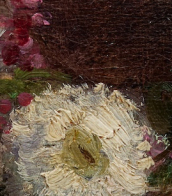

Giovanni Battista Salvi, known as Sassoferrato, was an Italian Baroque painter born in 1609 in Sassoferrato, from which he derived his name. He is celebrated for his deeply devotional images, particularly of the Virgin Mary, rendered with an elegance that echoes the works of Renaissance masters like Raphael and Perugino. Salvi's commitment to these older styles, amidst the 17th-century Roman art scene, marked his work as consciously anachronistic, emphasizing traditional religious themes and the serene beauty of his subjects.
Sassoferrato's training under his father and possibly under Domenichino in Rome, as well as influences from Guido Reni and Francesco Albani, equipped him with a unique blend of styles. He concentrated on creating multiple copies of devotional images, catering to the private market's demand during the Counter-Reformation. Despite a few public commissions, his legacy includes works in major collections such as the National Gallery in London and the British Royal Collection. Sassoferrato's art, particularly noted for its immaculate execution and spiritual aura, was highly regarded until the mid-19th century and has seen a revival in interest since the late 20th century.
One of his most revered works, "The Virgin in Prayer," showcases Sassoferrato's mastery in portraying the Virgin Mary with a life-like presence, using minimal but vibrant colors to highlight her contemplative grace. This piece, along with others, reflects the Catholic Church's 16th-century reforms advocating for personal devotion, a theme Sassoferrato adeptly captures through his intimate and contemplative religious scenes.
Despite the breadth of his work, Sassoferrato remains a somewhat enigmatic figure, with his art often overshadowing the details of his life and career. Yet, his paintings continue to be a source of admiration for their serene beauty and spiritual depth, appealing to collectors and art enthusiasts alike.
For those interested in exploring the work and legacy of Giovanni Battista Salvi, consider signing up for updates on new discoveries, sales, and auction events related to his art. This subscription ensures that collectors and experts remain informed about opportunities to engage with the timeless beauty of Sassoferrato's masterpieces.
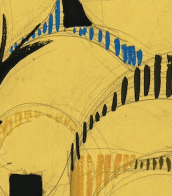

Giovanni Battista Salvi, known as Sassoferrato, was an Italian Baroque painter born in 1609 in Sassoferrato, from which he derived his name. He is celebrated for his deeply devotional images, particularly of the Virgin Mary, rendered with an elegance that echoes the works of Renaissance masters like Raphael and Perugino. Salvi's commitment to these older styles, amidst the 17th-century Roman art scene, marked his work as consciously anachronistic, emphasizing traditional religious themes and the serene beauty of his subjects.
Sassoferrato's training under his father and possibly under Domenichino in Rome, as well as influences from Guido Reni and Francesco Albani, equipped him with a unique blend of styles. He concentrated on creating multiple copies of devotional images, catering to the private market's demand during the Counter-Reformation. Despite a few public commissions, his legacy includes works in major collections such as the National Gallery in London and the British Royal Collection. Sassoferrato's art, particularly noted for its immaculate execution and spiritual aura, was highly regarded until the mid-19th century and has seen a revival in interest since the late 20th century.
One of his most revered works, "The Virgin in Prayer," showcases Sassoferrato's mastery in portraying the Virgin Mary with a life-like presence, using minimal but vibrant colors to highlight her contemplative grace. This piece, along with others, reflects the Catholic Church's 16th-century reforms advocating for personal devotion, a theme Sassoferrato adeptly captures through his intimate and contemplative religious scenes.
Despite the breadth of his work, Sassoferrato remains a somewhat enigmatic figure, with his art often overshadowing the details of his life and career. Yet, his paintings continue to be a source of admiration for their serene beauty and spiritual depth, appealing to collectors and art enthusiasts alike.
For those interested in exploring the work and legacy of Giovanni Battista Salvi, consider signing up for updates on new discoveries, sales, and auction events related to his art. This subscription ensures that collectors and experts remain informed about opportunities to engage with the timeless beauty of Sassoferrato's masterpieces.
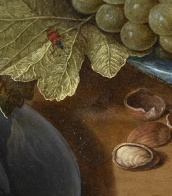

Giovanni Battista Salvi, known as Sassoferrato, was an Italian Baroque painter born in 1609 in Sassoferrato, from which he derived his name. He is celebrated for his deeply devotional images, particularly of the Virgin Mary, rendered with an elegance that echoes the works of Renaissance masters like Raphael and Perugino. Salvi's commitment to these older styles, amidst the 17th-century Roman art scene, marked his work as consciously anachronistic, emphasizing traditional religious themes and the serene beauty of his subjects.
Sassoferrato's training under his father and possibly under Domenichino in Rome, as well as influences from Guido Reni and Francesco Albani, equipped him with a unique blend of styles. He concentrated on creating multiple copies of devotional images, catering to the private market's demand during the Counter-Reformation. Despite a few public commissions, his legacy includes works in major collections such as the National Gallery in London and the British Royal Collection. Sassoferrato's art, particularly noted for its immaculate execution and spiritual aura, was highly regarded until the mid-19th century and has seen a revival in interest since the late 20th century.
One of his most revered works, "The Virgin in Prayer," showcases Sassoferrato's mastery in portraying the Virgin Mary with a life-like presence, using minimal but vibrant colors to highlight her contemplative grace. This piece, along with others, reflects the Catholic Church's 16th-century reforms advocating for personal devotion, a theme Sassoferrato adeptly captures through his intimate and contemplative religious scenes.
Despite the breadth of his work, Sassoferrato remains a somewhat enigmatic figure, with his art often overshadowing the details of his life and career. Yet, his paintings continue to be a source of admiration for their serene beauty and spiritual depth, appealing to collectors and art enthusiasts alike.
For those interested in exploring the work and legacy of Giovanni Battista Salvi, consider signing up for updates on new discoveries, sales, and auction events related to his art. This subscription ensures that collectors and experts remain informed about opportunities to engage with the timeless beauty of Sassoferrato's masterpieces.
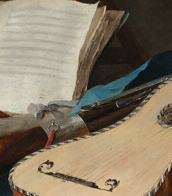

Giovanni Battista Salvi, known as Sassoferrato, was an Italian Baroque painter born in 1609 in Sassoferrato, from which he derived his name. He is celebrated for his deeply devotional images, particularly of the Virgin Mary, rendered with an elegance that echoes the works of Renaissance masters like Raphael and Perugino. Salvi's commitment to these older styles, amidst the 17th-century Roman art scene, marked his work as consciously anachronistic, emphasizing traditional religious themes and the serene beauty of his subjects.
Sassoferrato's training under his father and possibly under Domenichino in Rome, as well as influences from Guido Reni and Francesco Albani, equipped him with a unique blend of styles. He concentrated on creating multiple copies of devotional images, catering to the private market's demand during the Counter-Reformation. Despite a few public commissions, his legacy includes works in major collections such as the National Gallery in London and the British Royal Collection. Sassoferrato's art, particularly noted for its immaculate execution and spiritual aura, was highly regarded until the mid-19th century and has seen a revival in interest since the late 20th century.
One of his most revered works, "The Virgin in Prayer," showcases Sassoferrato's mastery in portraying the Virgin Mary with a life-like presence, using minimal but vibrant colors to highlight her contemplative grace. This piece, along with others, reflects the Catholic Church's 16th-century reforms advocating for personal devotion, a theme Sassoferrato adeptly captures through his intimate and contemplative religious scenes.
Despite the breadth of his work, Sassoferrato remains a somewhat enigmatic figure, with his art often overshadowing the details of his life and career. Yet, his paintings continue to be a source of admiration for their serene beauty and spiritual depth, appealing to collectors and art enthusiasts alike.
For those interested in exploring the work and legacy of Giovanni Battista Salvi, consider signing up for updates on new discoveries, sales, and auction events related to his art. This subscription ensures that collectors and experts remain informed about opportunities to engage with the timeless beauty of Sassoferrato's masterpieces.
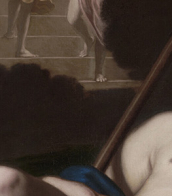

Giovanni Battista Salvi, known as Sassoferrato, was an Italian Baroque painter born in 1609 in Sassoferrato, from which he derived his name. He is celebrated for his deeply devotional images, particularly of the Virgin Mary, rendered with an elegance that echoes the works of Renaissance masters like Raphael and Perugino. Salvi's commitment to these older styles, amidst the 17th-century Roman art scene, marked his work as consciously anachronistic, emphasizing traditional religious themes and the serene beauty of his subjects.
Sassoferrato's training under his father and possibly under Domenichino in Rome, as well as influences from Guido Reni and Francesco Albani, equipped him with a unique blend of styles. He concentrated on creating multiple copies of devotional images, catering to the private market's demand during the Counter-Reformation. Despite a few public commissions, his legacy includes works in major collections such as the National Gallery in London and the British Royal Collection. Sassoferrato's art, particularly noted for its immaculate execution and spiritual aura, was highly regarded until the mid-19th century and has seen a revival in interest since the late 20th century.
One of his most revered works, "The Virgin in Prayer," showcases Sassoferrato's mastery in portraying the Virgin Mary with a life-like presence, using minimal but vibrant colors to highlight her contemplative grace. This piece, along with others, reflects the Catholic Church's 16th-century reforms advocating for personal devotion, a theme Sassoferrato adeptly captures through his intimate and contemplative religious scenes.
Despite the breadth of his work, Sassoferrato remains a somewhat enigmatic figure, with his art often overshadowing the details of his life and career. Yet, his paintings continue to be a source of admiration for their serene beauty and spiritual depth, appealing to collectors and art enthusiasts alike.
For those interested in exploring the work and legacy of Giovanni Battista Salvi, consider signing up for updates on new discoveries, sales, and auction events related to his art. This subscription ensures that collectors and experts remain informed about opportunities to engage with the timeless beauty of Sassoferrato's masterpieces.
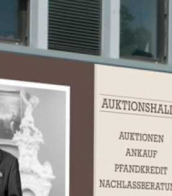

Giovanni Battista Salvi, known as Sassoferrato, was an Italian Baroque painter born in 1609 in Sassoferrato, from which he derived his name. He is celebrated for his deeply devotional images, particularly of the Virgin Mary, rendered with an elegance that echoes the works of Renaissance masters like Raphael and Perugino. Salvi's commitment to these older styles, amidst the 17th-century Roman art scene, marked his work as consciously anachronistic, emphasizing traditional religious themes and the serene beauty of his subjects.
Sassoferrato's training under his father and possibly under Domenichino in Rome, as well as influences from Guido Reni and Francesco Albani, equipped him with a unique blend of styles. He concentrated on creating multiple copies of devotional images, catering to the private market's demand during the Counter-Reformation. Despite a few public commissions, his legacy includes works in major collections such as the National Gallery in London and the British Royal Collection. Sassoferrato's art, particularly noted for its immaculate execution and spiritual aura, was highly regarded until the mid-19th century and has seen a revival in interest since the late 20th century.
One of his most revered works, "The Virgin in Prayer," showcases Sassoferrato's mastery in portraying the Virgin Mary with a life-like presence, using minimal but vibrant colors to highlight her contemplative grace. This piece, along with others, reflects the Catholic Church's 16th-century reforms advocating for personal devotion, a theme Sassoferrato adeptly captures through his intimate and contemplative religious scenes.
Despite the breadth of his work, Sassoferrato remains a somewhat enigmatic figure, with his art often overshadowing the details of his life and career. Yet, his paintings continue to be a source of admiration for their serene beauty and spiritual depth, appealing to collectors and art enthusiasts alike.
For those interested in exploring the work and legacy of Giovanni Battista Salvi, consider signing up for updates on new discoveries, sales, and auction events related to his art. This subscription ensures that collectors and experts remain informed about opportunities to engage with the timeless beauty of Sassoferrato's masterpieces.
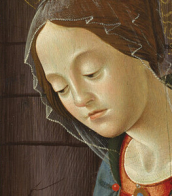

Giovanni Battista Salvi, known as Sassoferrato, was an Italian Baroque painter born in 1609 in Sassoferrato, from which he derived his name. He is celebrated for his deeply devotional images, particularly of the Virgin Mary, rendered with an elegance that echoes the works of Renaissance masters like Raphael and Perugino. Salvi's commitment to these older styles, amidst the 17th-century Roman art scene, marked his work as consciously anachronistic, emphasizing traditional religious themes and the serene beauty of his subjects.
Sassoferrato's training under his father and possibly under Domenichino in Rome, as well as influences from Guido Reni and Francesco Albani, equipped him with a unique blend of styles. He concentrated on creating multiple copies of devotional images, catering to the private market's demand during the Counter-Reformation. Despite a few public commissions, his legacy includes works in major collections such as the National Gallery in London and the British Royal Collection. Sassoferrato's art, particularly noted for its immaculate execution and spiritual aura, was highly regarded until the mid-19th century and has seen a revival in interest since the late 20th century.
One of his most revered works, "The Virgin in Prayer," showcases Sassoferrato's mastery in portraying the Virgin Mary with a life-like presence, using minimal but vibrant colors to highlight her contemplative grace. This piece, along with others, reflects the Catholic Church's 16th-century reforms advocating for personal devotion, a theme Sassoferrato adeptly captures through his intimate and contemplative religious scenes.
Despite the breadth of his work, Sassoferrato remains a somewhat enigmatic figure, with his art often overshadowing the details of his life and career. Yet, his paintings continue to be a source of admiration for their serene beauty and spiritual depth, appealing to collectors and art enthusiasts alike.
For those interested in exploring the work and legacy of Giovanni Battista Salvi, consider signing up for updates on new discoveries, sales, and auction events related to his art. This subscription ensures that collectors and experts remain informed about opportunities to engage with the timeless beauty of Sassoferrato's masterpieces.
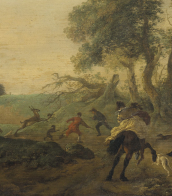

Giovanni Battista Salvi, known as Sassoferrato, was an Italian Baroque painter born in 1609 in Sassoferrato, from which he derived his name. He is celebrated for his deeply devotional images, particularly of the Virgin Mary, rendered with an elegance that echoes the works of Renaissance masters like Raphael and Perugino. Salvi's commitment to these older styles, amidst the 17th-century Roman art scene, marked his work as consciously anachronistic, emphasizing traditional religious themes and the serene beauty of his subjects.
Sassoferrato's training under his father and possibly under Domenichino in Rome, as well as influences from Guido Reni and Francesco Albani, equipped him with a unique blend of styles. He concentrated on creating multiple copies of devotional images, catering to the private market's demand during the Counter-Reformation. Despite a few public commissions, his legacy includes works in major collections such as the National Gallery in London and the British Royal Collection. Sassoferrato's art, particularly noted for its immaculate execution and spiritual aura, was highly regarded until the mid-19th century and has seen a revival in interest since the late 20th century.
One of his most revered works, "The Virgin in Prayer," showcases Sassoferrato's mastery in portraying the Virgin Mary with a life-like presence, using minimal but vibrant colors to highlight her contemplative grace. This piece, along with others, reflects the Catholic Church's 16th-century reforms advocating for personal devotion, a theme Sassoferrato adeptly captures through his intimate and contemplative religious scenes.
Despite the breadth of his work, Sassoferrato remains a somewhat enigmatic figure, with his art often overshadowing the details of his life and career. Yet, his paintings continue to be a source of admiration for their serene beauty and spiritual depth, appealing to collectors and art enthusiasts alike.
For those interested in exploring the work and legacy of Giovanni Battista Salvi, consider signing up for updates on new discoveries, sales, and auction events related to his art. This subscription ensures that collectors and experts remain informed about opportunities to engage with the timeless beauty of Sassoferrato's masterpieces.
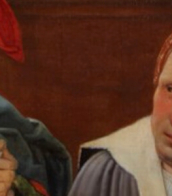

Giovanni Battista Salvi, known as Sassoferrato, was an Italian Baroque painter born in 1609 in Sassoferrato, from which he derived his name. He is celebrated for his deeply devotional images, particularly of the Virgin Mary, rendered with an elegance that echoes the works of Renaissance masters like Raphael and Perugino. Salvi's commitment to these older styles, amidst the 17th-century Roman art scene, marked his work as consciously anachronistic, emphasizing traditional religious themes and the serene beauty of his subjects.
Sassoferrato's training under his father and possibly under Domenichino in Rome, as well as influences from Guido Reni and Francesco Albani, equipped him with a unique blend of styles. He concentrated on creating multiple copies of devotional images, catering to the private market's demand during the Counter-Reformation. Despite a few public commissions, his legacy includes works in major collections such as the National Gallery in London and the British Royal Collection. Sassoferrato's art, particularly noted for its immaculate execution and spiritual aura, was highly regarded until the mid-19th century and has seen a revival in interest since the late 20th century.
One of his most revered works, "The Virgin in Prayer," showcases Sassoferrato's mastery in portraying the Virgin Mary with a life-like presence, using minimal but vibrant colors to highlight her contemplative grace. This piece, along with others, reflects the Catholic Church's 16th-century reforms advocating for personal devotion, a theme Sassoferrato adeptly captures through his intimate and contemplative religious scenes.
Despite the breadth of his work, Sassoferrato remains a somewhat enigmatic figure, with his art often overshadowing the details of his life and career. Yet, his paintings continue to be a source of admiration for their serene beauty and spiritual depth, appealing to collectors and art enthusiasts alike.
For those interested in exploring the work and legacy of Giovanni Battista Salvi, consider signing up for updates on new discoveries, sales, and auction events related to his art. This subscription ensures that collectors and experts remain informed about opportunities to engage with the timeless beauty of Sassoferrato's masterpieces.


Giovanni Battista Salvi, known as Sassoferrato, was an Italian Baroque painter born in 1609 in Sassoferrato, from which he derived his name. He is celebrated for his deeply devotional images, particularly of the Virgin Mary, rendered with an elegance that echoes the works of Renaissance masters like Raphael and Perugino. Salvi's commitment to these older styles, amidst the 17th-century Roman art scene, marked his work as consciously anachronistic, emphasizing traditional religious themes and the serene beauty of his subjects.
Sassoferrato's training under his father and possibly under Domenichino in Rome, as well as influences from Guido Reni and Francesco Albani, equipped him with a unique blend of styles. He concentrated on creating multiple copies of devotional images, catering to the private market's demand during the Counter-Reformation. Despite a few public commissions, his legacy includes works in major collections such as the National Gallery in London and the British Royal Collection. Sassoferrato's art, particularly noted for its immaculate execution and spiritual aura, was highly regarded until the mid-19th century and has seen a revival in interest since the late 20th century.
One of his most revered works, "The Virgin in Prayer," showcases Sassoferrato's mastery in portraying the Virgin Mary with a life-like presence, using minimal but vibrant colors to highlight her contemplative grace. This piece, along with others, reflects the Catholic Church's 16th-century reforms advocating for personal devotion, a theme Sassoferrato adeptly captures through his intimate and contemplative religious scenes.
Despite the breadth of his work, Sassoferrato remains a somewhat enigmatic figure, with his art often overshadowing the details of his life and career. Yet, his paintings continue to be a source of admiration for their serene beauty and spiritual depth, appealing to collectors and art enthusiasts alike.
For those interested in exploring the work and legacy of Giovanni Battista Salvi, consider signing up for updates on new discoveries, sales, and auction events related to his art. This subscription ensures that collectors and experts remain informed about opportunities to engage with the timeless beauty of Sassoferrato's masterpieces.
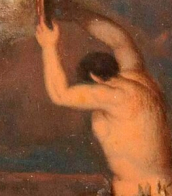

Giovanni Battista Salvi, known as Sassoferrato, was an Italian Baroque painter born in 1609 in Sassoferrato, from which he derived his name. He is celebrated for his deeply devotional images, particularly of the Virgin Mary, rendered with an elegance that echoes the works of Renaissance masters like Raphael and Perugino. Salvi's commitment to these older styles, amidst the 17th-century Roman art scene, marked his work as consciously anachronistic, emphasizing traditional religious themes and the serene beauty of his subjects.
Sassoferrato's training under his father and possibly under Domenichino in Rome, as well as influences from Guido Reni and Francesco Albani, equipped him with a unique blend of styles. He concentrated on creating multiple copies of devotional images, catering to the private market's demand during the Counter-Reformation. Despite a few public commissions, his legacy includes works in major collections such as the National Gallery in London and the British Royal Collection. Sassoferrato's art, particularly noted for its immaculate execution and spiritual aura, was highly regarded until the mid-19th century and has seen a revival in interest since the late 20th century.
One of his most revered works, "The Virgin in Prayer," showcases Sassoferrato's mastery in portraying the Virgin Mary with a life-like presence, using minimal but vibrant colors to highlight her contemplative grace. This piece, along with others, reflects the Catholic Church's 16th-century reforms advocating for personal devotion, a theme Sassoferrato adeptly captures through his intimate and contemplative religious scenes.
Despite the breadth of his work, Sassoferrato remains a somewhat enigmatic figure, with his art often overshadowing the details of his life and career. Yet, his paintings continue to be a source of admiration for their serene beauty and spiritual depth, appealing to collectors and art enthusiasts alike.
For those interested in exploring the work and legacy of Giovanni Battista Salvi, consider signing up for updates on new discoveries, sales, and auction events related to his art. This subscription ensures that collectors and experts remain informed about opportunities to engage with the timeless beauty of Sassoferrato's masterpieces.
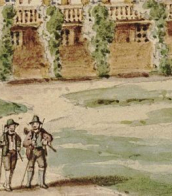

Giovanni Battista Salvi, known as Sassoferrato, was an Italian Baroque painter born in 1609 in Sassoferrato, from which he derived his name. He is celebrated for his deeply devotional images, particularly of the Virgin Mary, rendered with an elegance that echoes the works of Renaissance masters like Raphael and Perugino. Salvi's commitment to these older styles, amidst the 17th-century Roman art scene, marked his work as consciously anachronistic, emphasizing traditional religious themes and the serene beauty of his subjects.
Sassoferrato's training under his father and possibly under Domenichino in Rome, as well as influences from Guido Reni and Francesco Albani, equipped him with a unique blend of styles. He concentrated on creating multiple copies of devotional images, catering to the private market's demand during the Counter-Reformation. Despite a few public commissions, his legacy includes works in major collections such as the National Gallery in London and the British Royal Collection. Sassoferrato's art, particularly noted for its immaculate execution and spiritual aura, was highly regarded until the mid-19th century and has seen a revival in interest since the late 20th century.
One of his most revered works, "The Virgin in Prayer," showcases Sassoferrato's mastery in portraying the Virgin Mary with a life-like presence, using minimal but vibrant colors to highlight her contemplative grace. This piece, along with others, reflects the Catholic Church's 16th-century reforms advocating for personal devotion, a theme Sassoferrato adeptly captures through his intimate and contemplative religious scenes.
Despite the breadth of his work, Sassoferrato remains a somewhat enigmatic figure, with his art often overshadowing the details of his life and career. Yet, his paintings continue to be a source of admiration for their serene beauty and spiritual depth, appealing to collectors and art enthusiasts alike.
For those interested in exploring the work and legacy of Giovanni Battista Salvi, consider signing up for updates on new discoveries, sales, and auction events related to his art. This subscription ensures that collectors and experts remain informed about opportunities to engage with the timeless beauty of Sassoferrato's masterpieces.
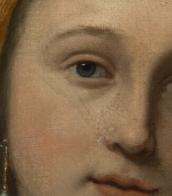

Giovanni Battista Salvi, known as Sassoferrato, was an Italian Baroque painter born in 1609 in Sassoferrato, from which he derived his name. He is celebrated for his deeply devotional images, particularly of the Virgin Mary, rendered with an elegance that echoes the works of Renaissance masters like Raphael and Perugino. Salvi's commitment to these older styles, amidst the 17th-century Roman art scene, marked his work as consciously anachronistic, emphasizing traditional religious themes and the serene beauty of his subjects.
Sassoferrato's training under his father and possibly under Domenichino in Rome, as well as influences from Guido Reni and Francesco Albani, equipped him with a unique blend of styles. He concentrated on creating multiple copies of devotional images, catering to the private market's demand during the Counter-Reformation. Despite a few public commissions, his legacy includes works in major collections such as the National Gallery in London and the British Royal Collection. Sassoferrato's art, particularly noted for its immaculate execution and spiritual aura, was highly regarded until the mid-19th century and has seen a revival in interest since the late 20th century.
One of his most revered works, "The Virgin in Prayer," showcases Sassoferrato's mastery in portraying the Virgin Mary with a life-like presence, using minimal but vibrant colors to highlight her contemplative grace. This piece, along with others, reflects the Catholic Church's 16th-century reforms advocating for personal devotion, a theme Sassoferrato adeptly captures through his intimate and contemplative religious scenes.
Despite the breadth of his work, Sassoferrato remains a somewhat enigmatic figure, with his art often overshadowing the details of his life and career. Yet, his paintings continue to be a source of admiration for their serene beauty and spiritual depth, appealing to collectors and art enthusiasts alike.
For those interested in exploring the work and legacy of Giovanni Battista Salvi, consider signing up for updates on new discoveries, sales, and auction events related to his art. This subscription ensures that collectors and experts remain informed about opportunities to engage with the timeless beauty of Sassoferrato's masterpieces.

